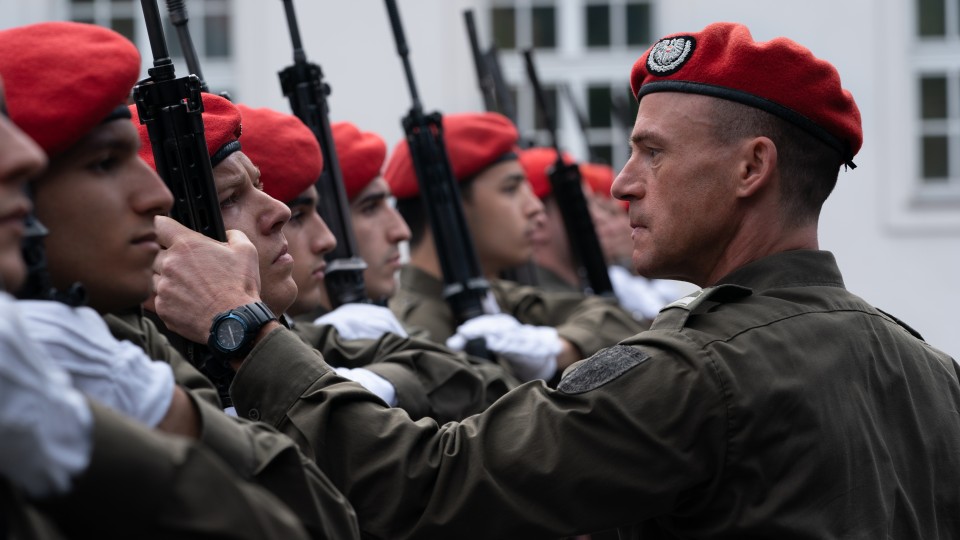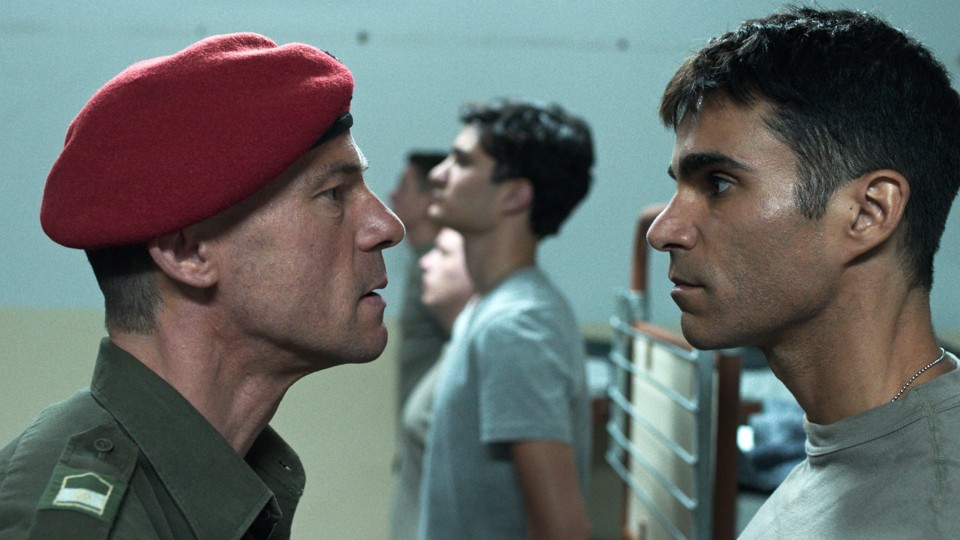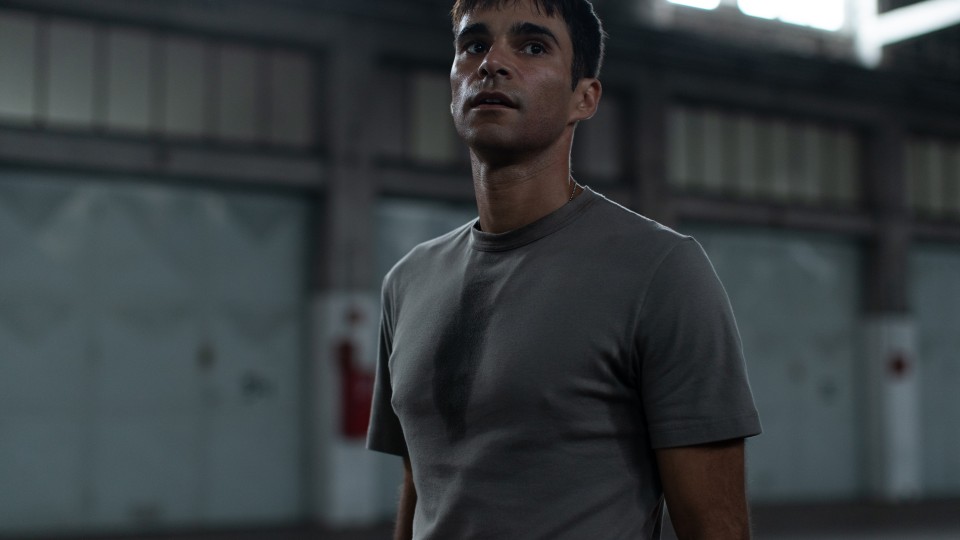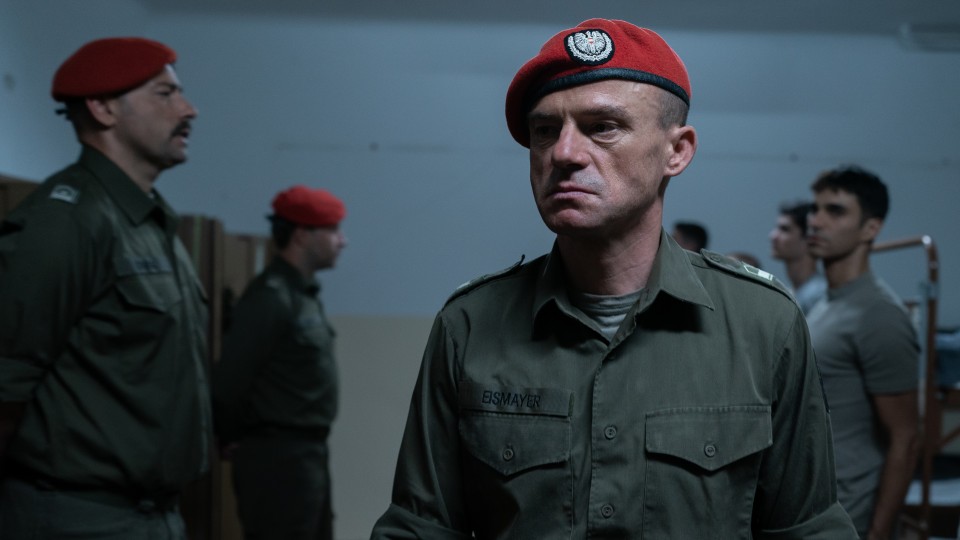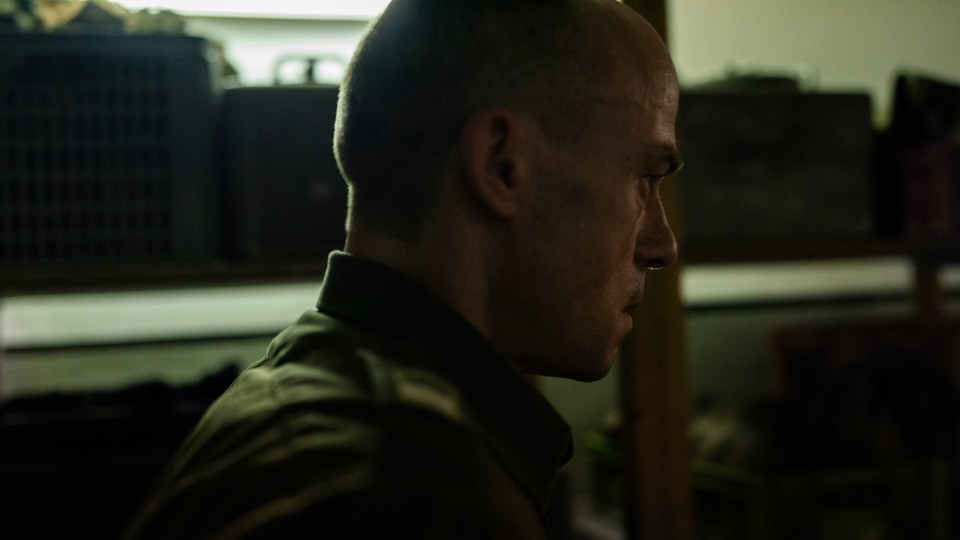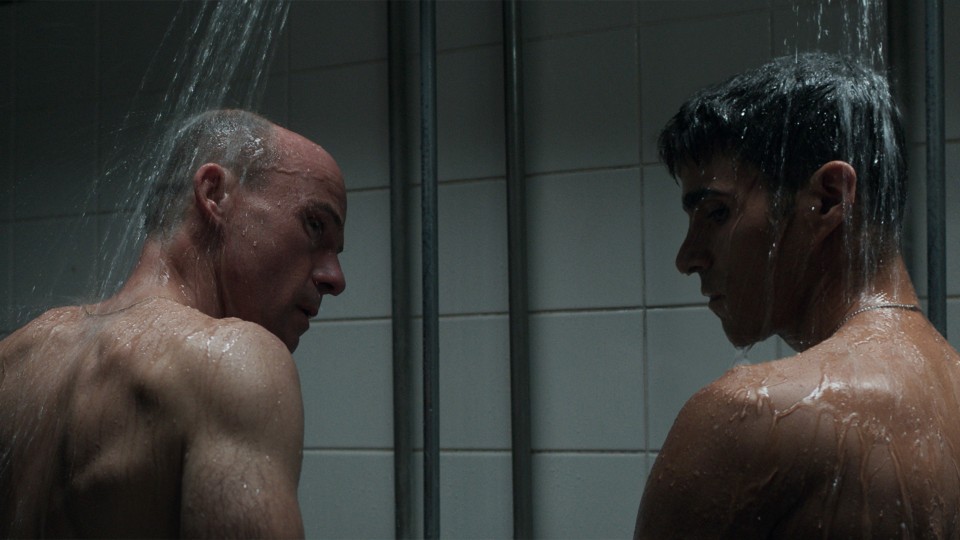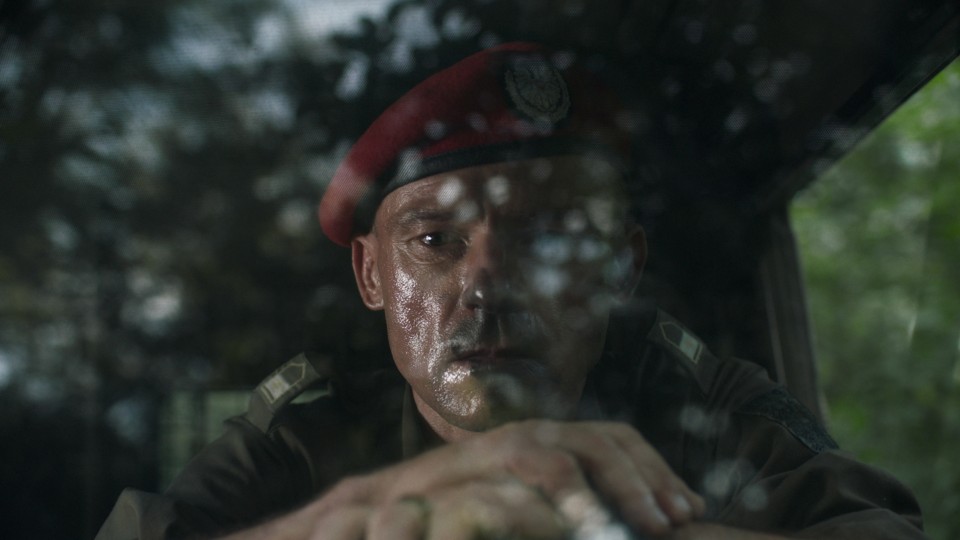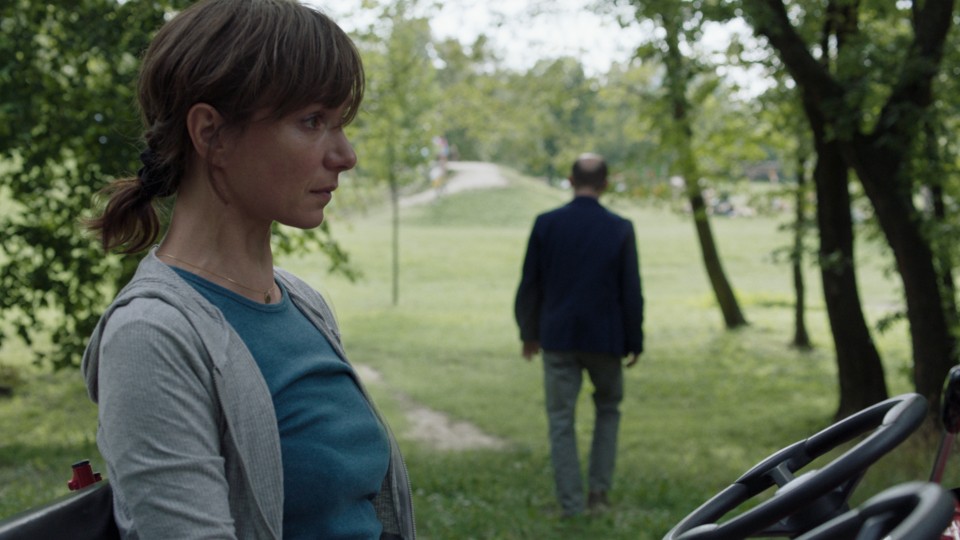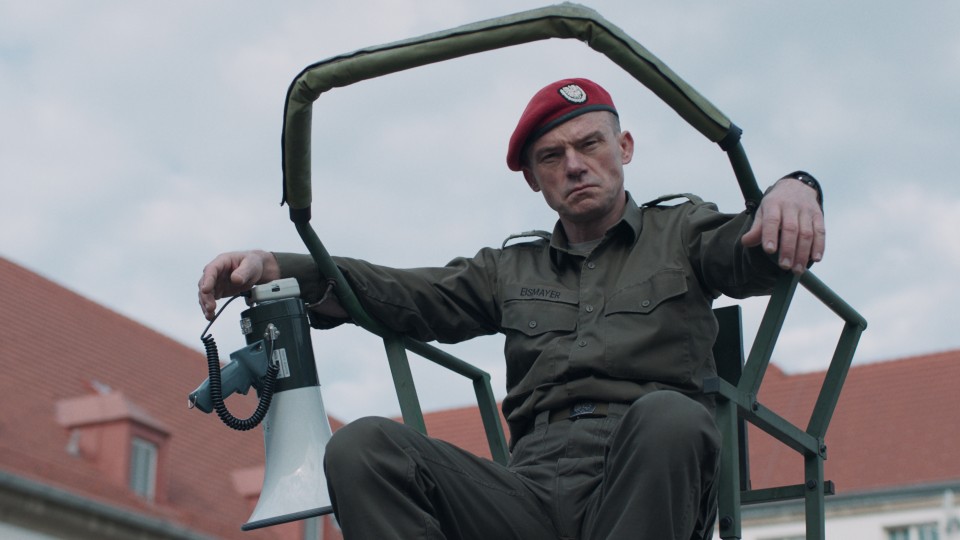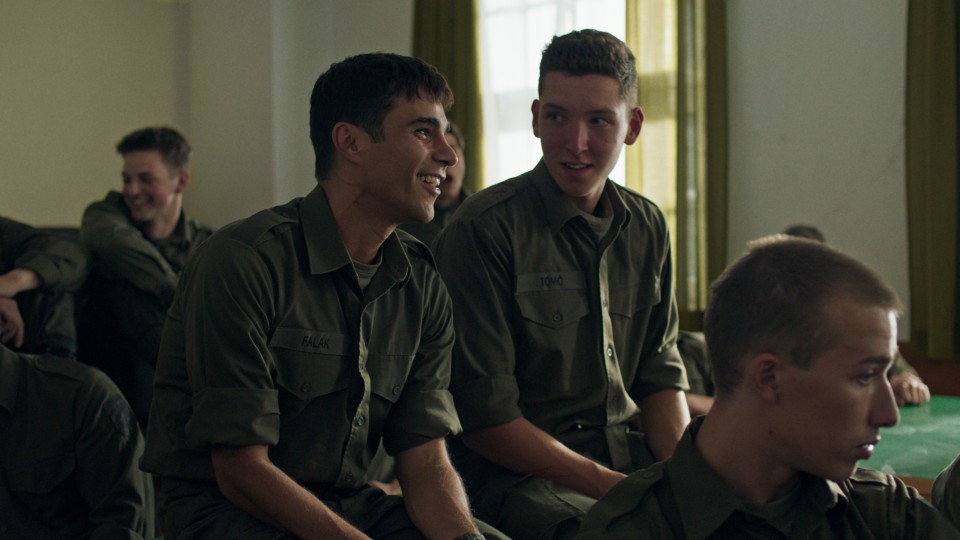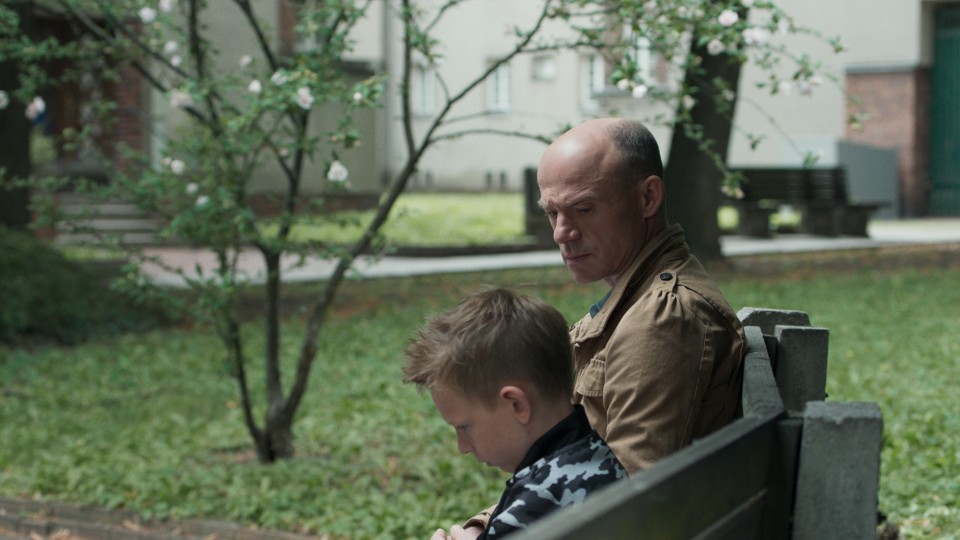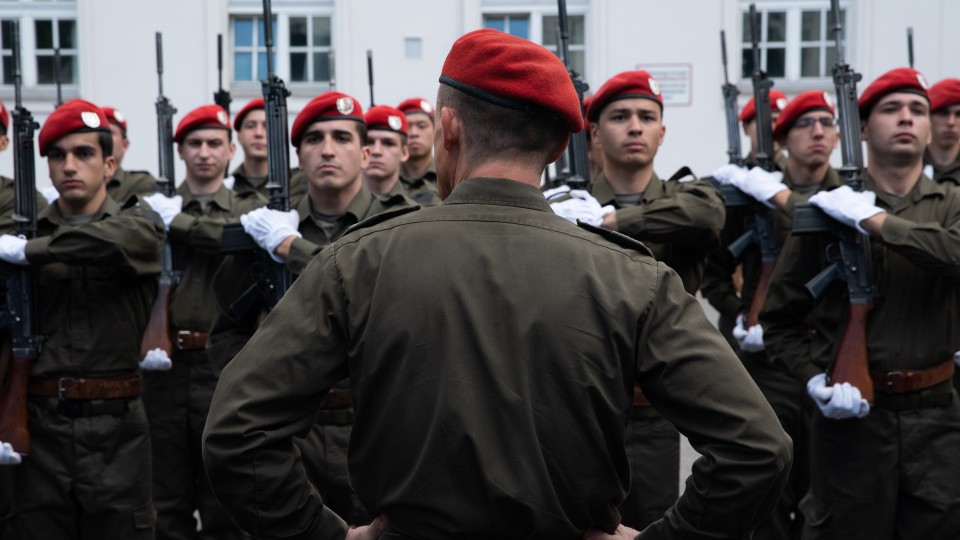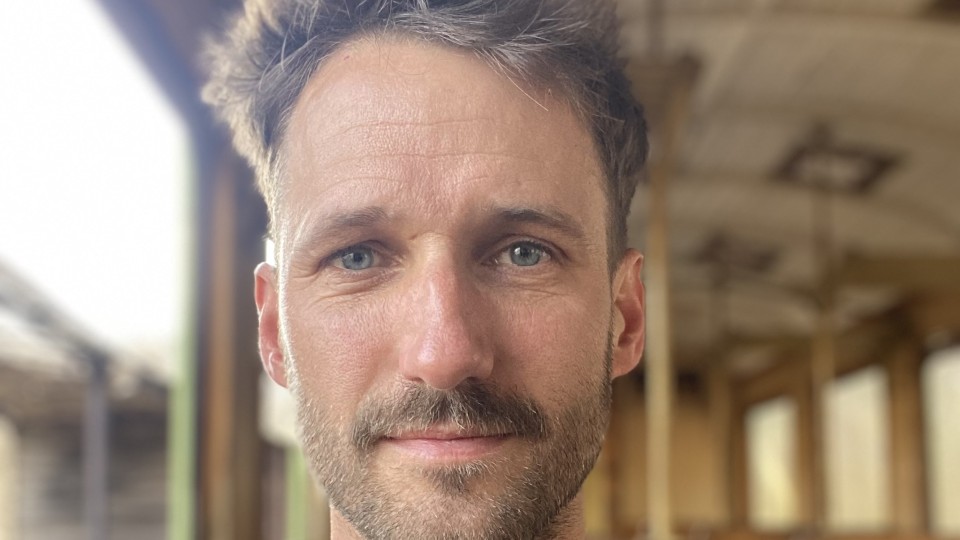None of his colleagues in the Austrian Army could have even dreamt that Eismayer was concealing a double life behind his brutal
rigour. The young soldiers under his command had nothing to laugh about. But when the recruit Mario Falak embarks upon his
military service, Charles Eismayer's life – consisting of the military, an apparently ideal family and hidden homosexuality
– begins to come apart. In his feature film debut EISMAYER David Wagner slowly lets the true and unusual love story take its course within the brittle structures of an army barracks.
EISMAYER is a love story featuring two men who met each other in the army under the most difficult circumstances. It is inspired
by true events and named after men who actually exist and are still active in the Austrian army. How little fiction did it
take to create the basis for a feature film screenplay?
DAVID WAGNER: The difficulty with the script was that a lot of the story already existed, and I had to decide what to include in my version
and what to leave out. When you hear the short summary it triggers a number of sensitive points, and straight away you have
the impression that it is a really amazing story. If you let the protagonist tell his story, the longer you listen, the more
you realize that it’s an accumulation of incredible experiences but ultimately less a dramaturgically compact story and more
a lifetime of events. After my research and the interviews I conducted with Charles Eismayer, deciding what to put into the
film, and placing these elements in a dramaturgical framework, was an extremely difficult process. If I had to answer the
question in percentages, I’d say I took about 30 percent 1:1 from reality, and the rest is fictionalized.
How did this story become public, and how did you come across it?
DAVID WAGNER: A friend who knew that I had served in the army drew my attention to an article which was published in the Kurier newspaper
after the two men got married. Of course, I was familiar with the name Eismayer.
Was it easy to convince the two protagonists to allow their story to be adapted for the cinema?
DAVID WAGNER: Charles Eismayer loves to hog the limelight, to put it bluntly – I mean, that’s his personality – and that really played into
my hands as a writer and director. Right from the first newspaper interviews it was clear that he wasn’t afraid to talk about
it. I had the impression that his outing prompted him to go on the offensive. At some point he realized it was better to go
all out if he wanted to gain acceptance. In that sense it wasn’t so hard to convince him to make a film of it. But it was
also crucial to spend some time getting to know each other, so he could trust me – and I could persuade him that I was the
right person to do it, because of course I wasn’t the only one interested in the material. I think it was a good thing that
I’d been in the army myself, that I listened a lot and that I didn’t immediately try to foist on him my ideas about what form
the project should take.
Did the two of them make the decision together?
DAVID WAGNER: They are a very close couple in every respect. They talk to each other about everything, so I'm sure they made the decision
together. And when I visited them at their home they took a pretty close look at me.
Did you explore the story of your protagonists primarily through conversations with Charles Eismayer and Mario Falak?
DAVID WAGNER: The newspaper article was something like the teaser and then – to stick with military jargon – I researched on two fronts:
the first was direct with Charles and Mario. For this purpose I conducted a three-hour interview with Charles Eismayer alone
and did the same with Mario, and I also had a lot of conversations with them off the record, where there was a great deal
of personal stuff. He told me about his whole life since childhood, and he opened up about the most intimate things. It was
clear that I would treat this personal experiences with great respect. The other "front" was the recruits – all of them men
– who had experienced Charles Eismayer in a military context. This other perspective was extremely important to me. You hear
really bad things about him, things he’s not particularly proud of, and he tends to play them down a bit. I wanted to hear
from people who had been affected, who’d experienced the full force of that. There was a spectrum from fanatical reverence
to complete rejection. Shedding light on the soldiers’ side of things was so important because of course there was a danger
that Eismayer would be glorified, and I didn’t want to make that mistake under any circumstances. It was a real balancing
act to ensure the audience didn’t lose sympathy for him completely, but if he’d seemed too likeable it would have sent the
wrong message.
Was that the hardest nut to crack, creating a plausible depiction of such a contradictory person?
DAVID WAGNER: The moment he let me into his life, I experienced him in a very different way than the soldiers did. He opened up to me in
such a way that he struck me as likeable. He didn’t conceal anything, and that took the wind out of my sails, because I then
felt I couldn’t condemn him. He conveyed very skilfully the way he reflected upon himself. I could see the danger – that I
might tend to be too sympathetic in my portrait of him – so I consciously tried to counter that. In the script phase I got
completely contrasting feedback, from too harsh to not tough enough. I tried to go my own way and trust my gut feeling. That
was certainly one of the most difficult things.
What was the effect of the fact that you were making a film about people alive today, and the result would also have to withstand
their scrutiny?
DAVID WAGNER: Naturally that thought was always present, but I have to say Charles Eismayer always held back. Of course, I had to give him
the script to read sooner or later. But I only did that when the first draft was finished and I’d been awarded a prize for
it at the Munich Film Festival. Displaying a huge amount of trust, he just said "Carry on!", and when he did read it at some
point he simply said "That’s fine". I think he only took a closer look at certain passages borrowed 1:1 from his biography
and then corrected details as far as military expressions are concerned. He didn’t interfere at all in dramaturgical terms.
To what extent were fundamental issues such as homosexuality in the army or the outdated treatment of recruits in human terms
part of your discussion?
DAVID WAGNER: The issues of homophobia in the army and – as variations on that theme in fact – sadism, machismo and brutality are symptoms
of the same core problem. In my view that is the toxic form of masculinity which still exists in the armed forces despite
some improvements in recent years. This is a major, fundamental problem in our society, and it’s exacerbated in the army.
Which makes it all the more gripping to depict a man who tries to be a man according to an outdated concept of masculinity,
so he’s tough, unyielding and even brutal, because he was never allowed to live out his innermost need: to love men, to be
gentle. He was always told by his parents growing up that being gay was a disease which would pass. He allowed himself to
be forced into a role that went on to develop a momentum of its own; he became a kind of hardcore monster for fear of being
exposed. For a while that worked very well. It was distracted attention from his inner being to such an extent that nobody
around him would ever have thought he was homosexual. A lot of people are still really stunned now – in 2022 – when they read
the newspaper article.
You cast the recruits with great attention to detail and depict the atmosphere of the young men among themselves. The harsh
humour, the homophobia, the fear, the physical and psychological strain. Is it necessary to have served in the army yourself
in order to portray this world from within?
DAVID WAGNER: A lot of work went into these details, but it was also a matter of making the right decisions. I knew many of the guys who
play the recruits from Arman T. Riahi’s Fox in the Hole, because I did the coaching with the young actors on that film. So
on the one hand I was familiar with them, and on top of that some of them had just finished their military service. I made
room for that in the film, because the experience was so fresh for the boys. The actors who hadn’t been in the army went through
a week’s training right before filming: they slept in the barracks, were drilled and yelled at, were given guns, had to crawl,
stand and exercise. That has a very quick effect on you. I can still remember the feeling really well. After just half a day
you know which way the wind blows, and that's scary when you come from a sheltered home and perhaps you're a high school graduate
too. It's a different world. The fun is over.
On top of that, we shot at original locations instead of in a studio. When you’re on set as a team in the Maria Theresa Barracks
and you hear the instructors yelling and striding around in their boots, when you don’t see any colours but red, green and
beige and you’re surrounded by a military environment 24/7, it quickly shapes you. It is hard to believe how quickly someone
slips into those clear, hierarchical structures. And as already mentioned, I experienced that myself, although not in the
barracks where Eismayer was; however, they knew about him in other barracks in Lower Austria and Burgenland. I was in the
army for eight months, and it was unbelievable how quickly the atmosphere of that time came flooding back as soon as I walked
into the barracks. Just the smell of the uniforms and the weapons. When I looked at the monitor, I immediately knew what was
right and what wasn’t.
How did you find this authentic language in the dialogue?
DAVID WAGNER: Language is a passion of mine. I love writing dialogue and really enjoyed that part of the work. My way of dealing with the
world has long been dictated by artistic confrontation. Now I had the chance to play with it. It was an ambivalent experience,
because it was also pleasurable to dig out all the layers and really go to town with being revolting and harsh, racist, sexist
and homophobic. At the same time, this was a tricky factor in the context of the Austrian Army, which is struggling with its
image; we were dependent on their support. I never felt compelled to make a film that was friendly to the armed forces. I
felt it was my mission to capture this really problematic situation, with the army as the context where the story plays out.
And valuable insights arise from that area of tension.
What was it like casting the two main actors, especially the very ambivalent role of Eismayer?
DAVID WAGNER: EISMAYER is my first feature film, so a lot of the experiences were very new. I studied in Hamburg and wasn’t up to date
about who was particularly popular in the Austrian film scene. But a lot of things just fell into my lap. Both Gerhard Liebmann
and Luka Dimić ic were recommended to me during the script phase by other students in the script workshop. I watched Gerhard
Liebmann's showreel, and it was clear that he’s exceptionally good and multi-layered. He was the one I wanted! I sent him
the script, and he agreed. It was similar with Luka Dimić. For his part I also had to confront the themes of acting and an
immigrant background, along with the everyday racism associated with that. In addition, Luka’s background has several things
in common with Mario Falak’s, so he brought a lot to the role. Then there was the question of whether those two would get
on, but actually the attraction between them is really believable. And Luka is such a delightful guy. It was important to
me that you could fall in love with him as a member of the audience, regardless of your gender or sexual orientation.
How did Gerhard Liebmann prepare for the double life he had to portray? How did you prepare for the shoot, as your first work
with actors?
DAVID WAGNER: We spent a lot of time together. One of our first joint ventures was to drive to the Seethaler Alpe military training area.
We stayed in an inn for five days and went hiking for seven hours a day; sometimes we talked, sometimes we didn't. In the
evenings we went through the script over glasses of pine schnapps and talked a lot, about ourselves and the story of Eismayer.
The essential thing was to find a direct, unambiguous language. We communicated a lot. We went over every single word together,
I listened to his suggestions, we chopped and changed again and again until the shoot; sometimes we even reviewed the takes
to see if we could get more out of it. It was a very beautiful time of digging for truthfulness, for authenticity. We also
spent time together with the real Charles Eismayer, and Gerhard absorbed every gesture and every word from him like a sponge.
I knew I could completely rely on him. Luka lives in Berlin, so we had to prepare and communicate via emails, zoom calls and
messengers. But it worked out fine. Of course, as a director, I had to think about locations, costumes and make-up, etc, but
the most important thing in my opinion was for me to sit, walk, stand and work on this role with the actors, to make them
feel they were doing a good job and I would support them, thus creating an atmosphere of trust where they could open up. But
I have to say I was under enormous time pressure and didn’t have enough time for everyone. It wasn’t clear for a long time
when shooting would start, and then suddenly it was decided at very short notice. Corona was part of the reason for that,
of course, but the cooperation with the Army was also rather sluggish until just before shooting. When we got the green light
we had to react very quickly. We needed not only the locations but also uniforms, weapons, cars, military advice... Without
this support, which was ultimately very helpful, the film would never have been feasible with our budgetary resources.
Another area of close cooperation with immediate relevance is with the DOP. How did you develop the visual language with Serafin
Spitzer?
DAVID WAGNER: Serafin Spitzer is a very focused, precise cameraman, which had a very good effect on the narrative form. I like to leave
things open, wait to see where a process leads, so Serafin's focus was the perfect complement; it forced me into a structure
where I could then be very creative. The film developed a strictness and sober quality that took a lot of getting used to
at first, but I like it very much now.
The film is structured around a recurring shot at the overgrown ruins of a house in the forest, very enigmatic images that
only open up at the end. What significance do these images have for you?
DAVID WAGNER: I only had 30 days of filming and had to delete several pages of the script two weeks before we started shooting in order
to keep to that shooting schedule. Many things were thrown out that created atmosphere and provided time to reflect. Towards
the end of the shoot, it turned out that exactly what had been deleted was now missing. We needed a level that gave us the
opportunity for introspection and thought. Then, out of the blue, we got an extra half a day of shooting, and I went back
with Serafin to the military training area, where we looked for images that opened up Eismayer's inner life to me. What we
found was a mixture of natural, organic, completely free-form growth and rigid building structures that are decaying. This
was emblematic of so many things: Eismayer's body, being a man, old structures that decay and make way for living. We just
started filming without knowing how I would use the images in the end. It was like a bunch of wild cards that I tried out
in different places during editing. At some point the dilemma dissolved, opening up a level we needed, where there’d be more
than just plot and action. The pictures with the names carved into the walls perhaps refer to the fates of men who weren’t
so lucky or didn’t have the chance or courage to get out of their situation. For them, it all remained a carving on the wall.
Interview: Karin Schiefer
July 2022
Translation: Charles Osborne

